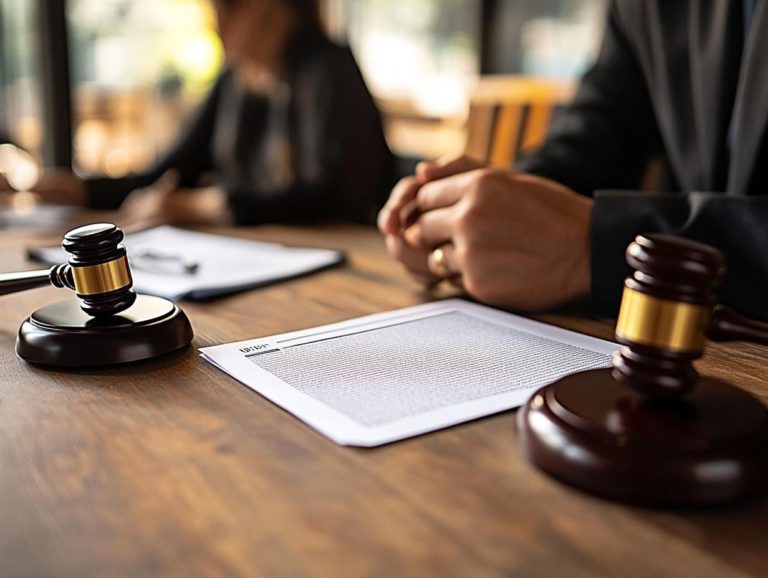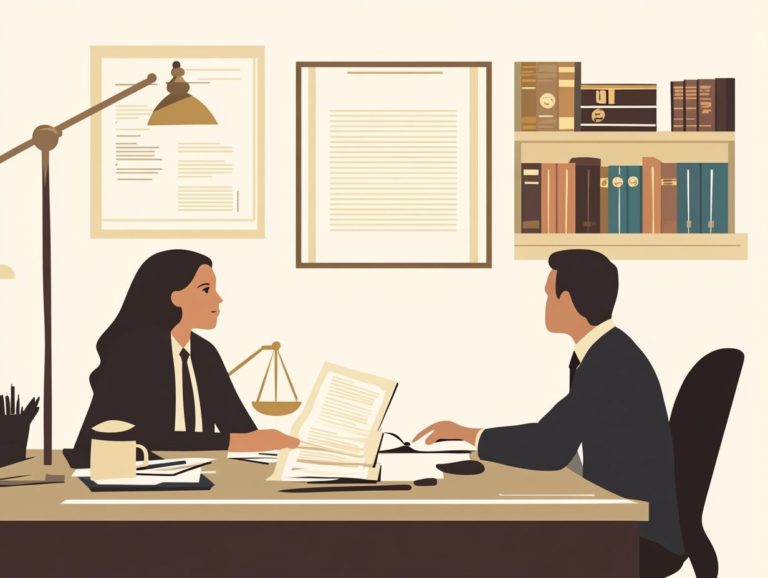How to Prepare for Your First Meeting with a Lawyer
Navigating the legal landscape can indeed feel overwhelming, particularly when it comes to selecting the right lawyer for your specific needs.
This article will guide you through everything you need to know before your first meeting, from grasping a lawyer s role to the essential questions you should ask.
You’ll also find insights on how to effectively research potential lawyers, prepare the necessary documents, and understand the costs involved.
With the right preparation, you can embark on your legal journey with both confidence and clarity.
Contents
- Key Takeaways:
- Understanding the Role of a Lawyer
- Researching and Choosing a Lawyer
- Preparing for the Initial Meeting
- Questions to Ask Your Lawyer
- Understanding Legal Fees and Costs
- Follow-up Actions After the Meeting
- Frequently Asked Questions
- What should I bring to my first meeting with a lawyer?
- How can I make the most out of my first meeting with a lawyer?
- What questions should I ask during my first meeting with a lawyer?
- How can I find the right lawyer for my case?
- What information should I provide to my lawyer during the first meeting?
- Should I be concerned about confidentiality during my first meeting with a lawyer?
Key Takeaways:
- Understand your lawyer’s role.
- Research lawyers based on experience, specialization, and fees.
- Gather necessary documents for your meeting.
- Discuss important topics like fees and next steps.
Understanding the Role of a Lawyer
Understanding the role of a lawyer is vital, as it includes many tasks, such as providing legal advice, representing clients in court, and keeping your information private.
A skilled attorney not only guides you through the intricate legal landscape but also offers emotional support during trying times. It’s essential for you to be aware of your rights and the legal strategies at your disposal. This ensures that you receive tailored legal representation suited to your unique circumstances.
What a Lawyer Can and Cannot Do for You
A lawyer can offer invaluable legal advice and representation, but it’s essential for you to understand the limitations of their role in navigating legal issues.
They are skilled advocates who can effectively represent you in court, crafting compelling arguments and presenting evidence to bolster your claims or defenses. Beyond the courtroom, their expertise allows them to provide tailored legal advice, assisting you and your business in making informed decisions about contracts, compliance, and disputes.
However, it s crucial to recognize that these professionals cannot guarantee specific outcomes, as legal circumstances can be unpredictable. Attorneys must avoid making decisions on your behalf, ensuring you retain control over your legal matters while benefiting from their professional guidance.
Researching and Choosing a Lawyer
Choosing the right attorney involves several key considerations, including their experience, specialization in areas like family law or personal injury, and the complexity of your case. All of these factors can greatly impact the legal fees you may incur.
The attorney s reputation within the bar association and insights offered by client testimonials are vital in this selection process.
These elements ensure that you find a lawyer who not only meets your legal requirements but also aligns well with your expectations and needs.
Factors to Consider in Your Selection
When selecting an attorney, it’s essential to consider various factors such as their experience, specialization, and expected legal fees to ensure you receive effective representation.
Specialization is particularly important in fields like personal injury or family law, where the nuances require a unique set of skills and knowledge. An attorney experienced in these specific areas is more likely to navigate complex cases adeptly.
The experience an attorney offers can significantly sway the outcome of your case; seasoned professionals often have established relationships with courts and a deeper understanding of legal intricacies.
It’s important to understand how these qualifications influence legal fees, as specialized representation may come with a higher price tag. By understanding these elements, you empower yourself to make informed decisions that align with both your legal needs and your budget.
Preparing for the Initial Meeting

Preparing for your initial consultation with your attorney means gathering essential documents and evidence, which is vital for a successful meeting. To ensure you’re fully ready, learn how to prepare for a consultation with a defense attorney. This preparation sets the stage for your case and ensures that your attorney has all the necessary information to offer you informed legal advice.
You’ll want to compile documents like court records and client information sheets related to your specific legal needs. This not only enhances your discussion but also paves the way for a more productive exploration of potential legal strategies.
Your first meeting with a lawyer is a big step! Get ready to take control of your legal journey!
Gathering Important Documents and Information
Gathering important documents and client information sheets is a crucial step in your consultation process. This step sets a strong foundation, allowing your attorney to gain a comprehensive understanding of your situation. It ensures that you and your attorney are aligned, enabling them to navigate the complexities of your case with greater ease.
For instance, in personal injury scenarios, you may need to provide the following:
- Medical records
- Accident reports
- Witness statements
Conversely, divorce cases typically require financial documentation, such as:
- Tax returns
- Prenuptial agreements
Collecting these documents boosts your case and streamlines the legal process, making it easier for your attorney to advocate effectively on your behalf. By being organized and proactive about gathering documentation, you can significantly influence the outcome of your legal battle.
Questions to Ask Your Lawyer
Asking the right questions during your initial consultation is crucial for grasping your legal options and ensuring that your expectations align with those of your attorney. Your questions can shape the success of your case!
Preparing a thoughtful list of inquiries not only showcases your commitment but also paves the way for transparent communication. You might want to inquire about case management practices, upfront payment agreements, and the anticipated timeline for legal proceedings to better understand the direction your case may take.
Key Topics to Discuss
During your consultation, it’s essential to speak openly about your situation. Ensuring your attorney fully grasps the nuances of your case will significantly inform the development of effective legal strategies.
Creating an atmosphere of transparency enables your legal counsel to understand not only the factual elements but also the emotional weight of your circumstances. This conversation should cover crucial topics such as:
- Any pertinent documentation
- Deadlines for filing motions
- Potential outcomes
Don t hesitate to voice your specific concerns about the legal process, including any other ways to resolve disputes that might be available. Emotional support plays a pivotal role during this time; sharing your feelings about the case allows your attorney to provide more tailored guidance, ultimately enhancing the overall approach to meet your individual needs.
Understanding Legal Fees and Costs
Understanding legal fees and costs is crucial as you seek legal representation, as these elements can greatly impact your journey toward justice. Whether you re dealing with an upfront payment agreement or hourly rates, being well-informed about the costs associated with your case enables you to budget and plan effectively.
Discussing legal insurance options during your initial consultation provides valuable insights into potential expenses, ensuring you re fully equipped to navigate the financial aspects of your legal journey.
How Much to Expect and How to Negotiate

Regarding legal fees, having a clear understanding of what to expect and mastering the art of negotiation can profoundly influence your case’s financial management.
Several factors play a crucial role here, including the complexity of your legal issue, the attorney’s level of experience, and the prevailing pricing trends in your region. Familiarizing yourself with these elements equips you for more fruitful discussions about costs.
It’s essential to gather multiple quotes and explore different billing structures whether hourly or flat rates to determine what fits your needs best. Establishing a transparent line of communication with your attorney is vital.
You should feel empowered to discuss your budget constraints and any unexpected expenses that may crop up. By fostering this transparency, you ensure that you remain informed and engaged throughout the legal process.
Follow-up Actions After the Meeting
After your initial meeting with an attorney, it s essential to grasp the next steps and the timeline for your case. This understanding is vital for effective case management and for preparing yourself for what lies ahead.
Being aware of what to expect enables you to plan better, ensuring that you are fully equipped for the legal journey that awaits you. Stay proactive and keep communication open with your attorney to navigate your case confidently!
Next Steps and Timeline
Understanding the next steps in your legal journey and the corresponding timeline is essential for effective case management. This ensures you’re fully prepared for upcoming legal proceedings.
After your consultation, promptly gather necessary documentation, such as medical records, contracts, or photographs that could strengthen your case. This evidence plays a crucial role in establishing facts and supporting your claims.
You may need to complete specific forms or agreements provided during your meeting to streamline the legal process. Staying organized and proactive at this stage promotes clear communication with your legal team and helps meet deadlines that could significantly influence the outcome of your case.
Carefully keeping track of all documentation will strengthen your position as you progress.
Frequently Asked Questions
What should I bring to my first meeting with a lawyer?
Don’t forget to bring important documents related to your case, such as contracts, legal agreements, or correspondence with the other party. It’s also helpful to come with a list of questions or concerns you have for the lawyer, including what to bring to your first attorney meeting.
How can I make the most out of my first meeting with a lawyer?

Prepare with a clear understanding of your case and the outcome you seek. To ensure a productive discussion, check out this guide on how to prepare for your first meeting with a lawyer. Be honest and open with your lawyer about any relevant information. Take notes during the meeting and ask for clarification if needed.
What questions should I ask during my first meeting with a lawyer?
Some important questions to ask during your first meeting are:
- What is your experience with cases like mine?
- What are the potential outcomes of my case?
- What is your strategy for handling my case?
- What are the potential costs and fees involved?
How can I find the right lawyer for my case?
Research different lawyers and law firms in your area that specialize in your type of case. Look for reviews and testimonials from previous clients, and ask for recommendations from friends or family who have had positive experiences with a lawyer.
What information should I provide to my lawyer during the first meeting?
Be sure to share relevant documents and details about your case with your lawyer. This can include names, dates, and any evidence you have. It’s also important to disclose any previous legal matters or history that may impact your case.
Should I be concerned about confidentiality during my first meeting with a lawyer?
Yes, you should feel assured of confidentiality when meeting with a lawyer. Any information you share is protected by attorney-client privilege, meaning it cannot be shared without your permission.
Act now to prepare yourself for a successful legal journey!






